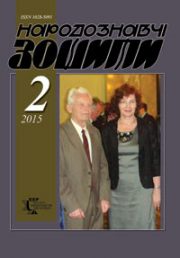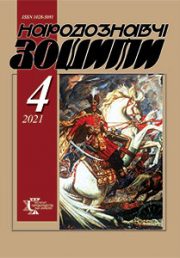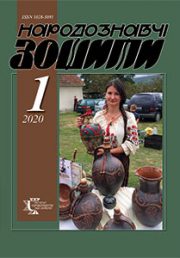The Ethnology Notebooks. 2017, 6 (138), 1557—1568
UDK 2718443(477.8322)”188/195″
DOI https://doi.org/10.15407/nz2017.06.1557
Received 2.11.2017
Horbal Mariia Yulianivna, leading scientific editor of the Institute of Ethnology of the National Academy of Sciences of Ukraine.
Svobody Avenue 15, Lviv, 79000, Ukraine.
Contacts: Tel. (067)7117846; e-mail: horbal.m@gmail.com
Abstract. A research about religious life of a village Selysko in a Lviv region in the second part XIX — the first part of XX centuries has been made. In this article it is pointed out a significance of a church as an institution that has made a big impact on developing a code of ethics and Christian foundation in the community of the village.
Keywords: Selysko village, church, priests, religious chronology, community.
REFERENCES
TsDIA Ukrainy, L’viv. F. 201. Op. IV. Spr. 827. [in Ukrainian]
TsDIA Ukrainy, L’viv. F. 201. Op. IV. Spr. 2846. [in Ukrainian]
TsDIA Ukrainy, L’viv. F. 201. Op. 2A. Hreko-katolyts’ka mytropolycha konsystoriia. L’viv. 1806—1945. [in Ukrainian]
TsDIA Ukrainy, L’viv. F. 201. Op. III. Spr. 56—70. [in Ukrainian]
TsDIA Ukrainy, L’viv. F. 201. Op. III. Spr. 71—122. [in Ukrainian]
TsDIA Ukrainy, L’viv. F. 201. Op. 4A. Spr. 7123. [in Ukrainian]
Blazhejovs’kyj, D. (2004). Istorychnyj shematyzm L’vivs’koi ieparkhii 1832—1944 (Vol. 1). Kyiv : KM Akademiia. [in Ukrainian]
Horbal’, M. (2017). Zaliudnenist’ sela Selys’ko na L’vivschyni. The Ethnology Notebooks, 2, 400—415. [in Ukrainian]
Hrytsak, Ya. (1996). Narysy istorii Ukrainy. Formuvannia modernoi ukrains’koi natsii XIX—XX st. Kyiv. [in Ukrainian]
Dymytrij, Patriarkh. (1998). Tserkovne budivnytstvo Zakhidnoi Ukrainy. L’viv. [in Ukrainian]
Korniaieva, H. (2004). Ukrains’ka dytiacha knyzhka Halychyny (druha polovyna XIX st. — 1939 r.). L’viv. [in Ukrainian]
Kunyts’kyj, L. (1927). Viter vid moria. L’viv. [in Ukrainian]
Sapeliak, A., iep. (2002). Kyivs’ka Tserkva na slov’ians’komu Skhodi. Kanonichno-ekumenichnyj aspekt. L’viv. [in Ukrainian]
Taras, Ya. (2007). Sakral’na derev’iana arkhitektura ukraintsiv Karpat. L’viv. [in Ukrainian]
Fihol’, V. (1937, november). Abstynents’kyj rukh v nasvitlenniu katolyts’koi Tserkvy. Nyva. [in Ukrainian]
Shematyzm vsechesnoho klira mytropol. arkhiietsezij hreko-katolycheskoj L’vovskoj (Dali — Shematyzm) na rok 1882. (1882). L’vov : Iz typohrafiy Stavropyhijskoho Ynstytuta pod upravleniem’ Stefana Huchkovskoho. [in Russian]
Shematyzm na rik 1931/32. (1931). L’viv : Nakladom kantseliarii mytropolychoi konsystorii. [in Ukrainian]
Shematyzm na rik 1932/33. (1932). L’viv : Nakladom kantseliarii mytropolychoi konsystorii. [in Ukrainian]
Shematyzm na rik 1935/36. (1935). L’viv : Nakladom kantseliarii mytropolychoi konsystorii. [in Ukrainian]
Sheptyts’kyj, A. (1965). Pro tserkovne bratstvo. Iz Pastyrs’koho poslannia Andreia Sheptyts’koho, Halyts’koho mytropolyta, do virnykh svoikh ieparkhij, pysanyj u Krekhovi v nediliu Mytaria i Faryseia, R. B. 1905. In A. Sheptyts’kyj, Tvory Sluhy Bozhoho mytropolyta Andreia Sheptyts’koho: pastyrs’ki lysty (Vol. 1). Toronto. [in Ukrainian]
Andrej Sheptyts’kyj. Retrieved from https://uk.wikipedia.org/wiki/ (Last accessed: 11.09.2017).
Vladyka Andrej — Kniaz’ Tserkvy. Retrieved from http://ugcc.kharkiv.ua/vladikaandreyknyaztserkviinarodu (Last accessed: 11.09.2017).
Istoriia Borot’by UHKTs proty pyiatstva. Retrieved from http://zdorovia.ugcc.org.ua/istoriyaborotbyuhktsprotypyyatstva/ (Last accessed: 11.09.2017).
Istoriia borot’by tserkvy proty pyiatstva. Retrieved from http://www.bratstvo.pp.ua/2011/02/blogpost_1068.html (Last accessed: 11.09.2017).
Selians’ka reforma 1848. Retrieved from https://uk.wikipedia.org/wiki/ (Last accessed: 11.09.2017)
Ukrains’ka katolyts’ka relihijnotserkovna presa. Retrieved from https://uk.wikipedia.org/wiki/ (Last accessed: 11.09.2017).
Ustyianovych Mykola Leontijovych. Retrieved from https://uk.wikipedia.org/wiki/ (Last accessed: 11.09.2017).







